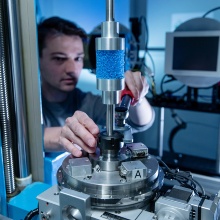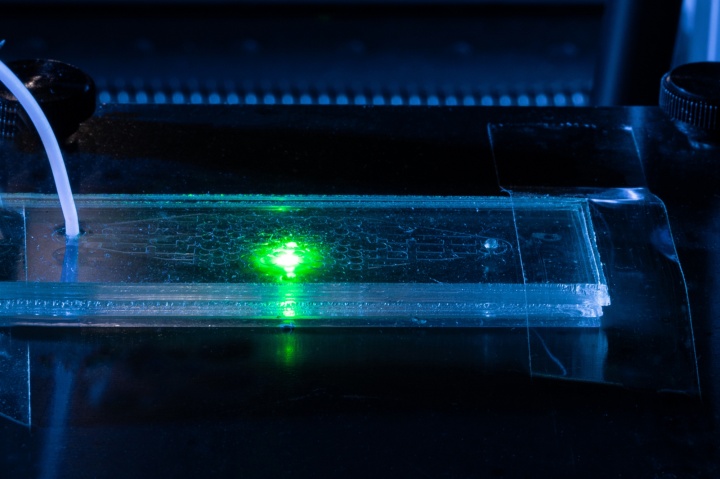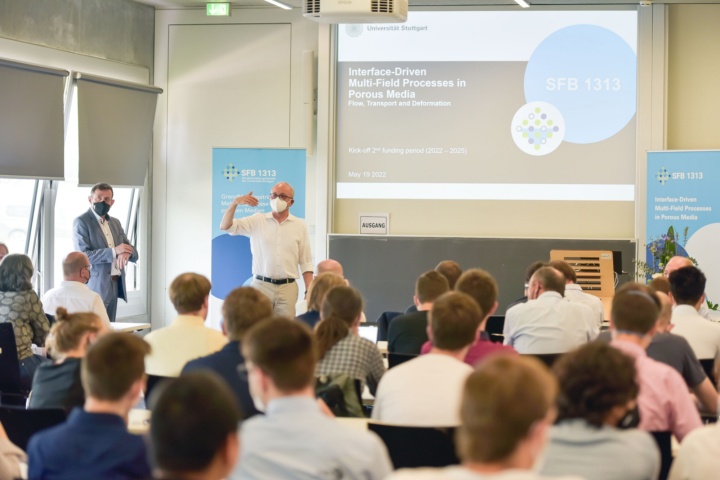Whether 3D images from the inside of a concrete block or the behavior of oil-water mixtures in the subsurface: X-ray tomography and microfluidic techniques are important tools for visualizing and comprehending the invisible flow and transport processes as well as the deformation behavior in porous media. The Porous Media Lab (PML) at the University of Stuttgart, which is now located in a single place on the Vaihingen Campus, provides a comprehensive platform for this purpose. As a “shared lab”, it is also available to visiting scientists from Germany and abroad.
The XRCT Lab, which is an X-ray tomograph developed at the PML, is one core part of the PML. It creates 3D images from non-transparent materials and enables researchers to gain high-resolution insights into phenomena at the pore scale. What makes it special: The XRCT Lab combines imaging with physical experiments and can thus visualize how, for example, the pressure, the flow of liquids, and temperature fluctuations in a material affect effective material properties at the pore level.
The PML’s second core part is the Microfluidic Lab, where synthetic porous materials can be created. For this purpose, opto-lithographic processes are used for making a kind of mold, which is then cast with a soft polymer (PDMS). This creates a two-dimensional porous medium that is transparent and can be examined under a microscope. In this way, scientists can, for example, visualize how multiphase fluids, such as an oil-water mixture, behave in a porous medium – findings that could be applied in deep geothermal energy systems or in fuel cells, among other things.
In addition, the PML also includes a Specimen Preparation Lab, which provides devices and methods for the preparation of rock samples and the creation of polymer specimens (using various 3D printing techniques or laboratory-based injection molding). Both in the Granular Media Lab and in the Rock Physics Lab, there are various low- and high-pressure cells available for the characterization of the stress-dependent material behavior of rock and soil samples. In this way, the macroscopic material behavior of larger samples with diameters of a few centimeters can be studied. Finally, the Rheology Lab enables scientists to mechanically characterize soft materials such as (multi-)functional polymers for the application in actuators that are used, for example, in “soft robotics”.
The key to data-driven simulation models
Understanding complex physical, and in some cases time-dependent, processes at the pore scale is key to developing further data-driven simulation models. The PML is also a central experimental platform, which is used by both the Cluster of Excellence “Data-Integrated Simulation Science” (EXC 2075, SimTech) and the Collaborative Research Center “Interface-Driven Multi-Field Processes in Porous Media. Flow, Transport and Deformation” (SFB 1313) at the University of Stuttgart. At the SFB 1313, which launched its second funding phase in May 2022 with a kick-off event, about 60 researchers from nine institutes of the University of Stuttgart are working with scientists from about 35 partner institutions toward the overarching goal of gaining a fundamental understanding of the processes occurring in porous media.
Stimulating for research collaborations
Researchers from other institutes of the University of Stuttgart as well as visiting scientists from Germany and abroad are also using the PML for their research. “The still very young PML has already been able to establish itself very successfully as a ‘shared lab’, and we will be able to further develop the experimental characterization methods,” Prof Holger Steeb is pleased to say. The scientist is a Principal Investigator at the SFB 1313 as well as a member of the management board in the SimTech Cluster of Excellence. “It is impressive how the PML is stimulating outstanding local, national, and international research collaborations.”
Expert Contact:
Prof. Holger Steeb, University of Stuttgart, Institute of Applied Mechanics (MIB), phone: +49 711 685 66029, e-mail
Website of the Porous Media Lab https://www.mib.uni-stuttgart.de/pml





